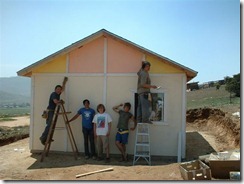One of the most useful words I ever learned does not exist in English.
I learned in in Spanish class, where I was taught it meant “enough” but also could be used similar to the way we use “kinda”.
Like most things I learned in high school Spanish class it was promptly forgotten, but my memory was rekindled when I took a mission trip to Mexico, and found that it was incredibly handy for a missionary.
To someone who doesn’t know the language with any level of fluency, everything between “Sí” and “No” is “bastante”. And to someone whos eyes are being opened for the first time in a dusty impoverished border town, just about everything lies somewhere between “Sí” and “No”
Did you sleep well? “Bastante”
Is the water safe to drink? “Bastante”
Do you speak any Spanish? “Bastante”
Are we going to finish on time? “Bastante”
 It got to the point that “bastante” became the motto for work in Mexico. It took on a life that goes beyond it’s literal meaning in Spanish grammar. We were a crew of teenagers who had no idea what we were doing, didn’t speak the language, and would be gone in a week. We couldn’t pretend like the house we were going to build would be great, or that out outreach to the community would “work”. But we could make sure it was bastante. That it was “good enough” that is was “sufficient”
It got to the point that “bastante” became the motto for work in Mexico. It took on a life that goes beyond it’s literal meaning in Spanish grammar. We were a crew of teenagers who had no idea what we were doing, didn’t speak the language, and would be gone in a week. We couldn’t pretend like the house we were going to build would be great, or that out outreach to the community would “work”. But we could make sure it was bastante. That it was “good enough” that is was “sufficient”
Bastante doesn’t mean you do the bare minimum, the way the English word “enough” implies. Bastante means you get it done, and you do a good job considering. You can’t go and visit a family of four living in a shack made of tarp and pallet racking and call anything “good” at the end of the day. neither can you say the problem is “solved” or the job is “done”. What you can do is dig a trench so that when it rains the water goes around and doesn’t run through the house and make the baby sick.

